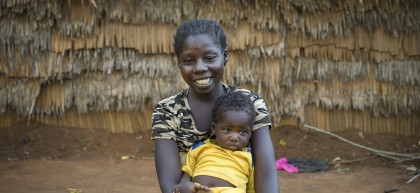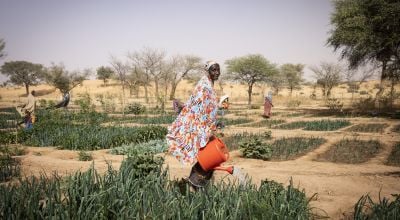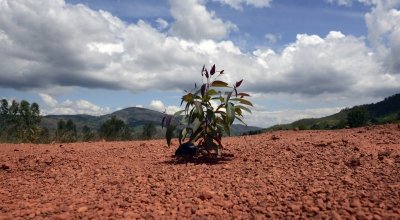
Knowledge Hub
When we meet Chawda Zakariaou, she is overjoyed that her eight-month-old daughter will soon be discharged after seven worrying days of treatment.
Little Ousseina was weak and extremely vulnerable when first admitted to the Concern-supported special stabilisation centre for mothers and children in Tahoua. Her situation was complicated. She was severely malnourished, dehydrated, anaemic and had malaria.
After a week of receiving medication, fortified food, and care and attention, Ousseina has steadily grown stronger and more alert. It is almost time to return home.
"She is breastfeeding again", says Chawda.
It makes me smile - I couldn’t do that before because she was very ill. I’m happy to see her recovering.
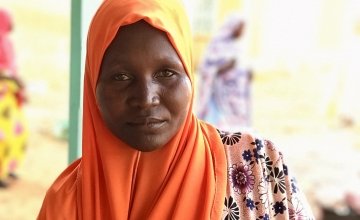
But Chawda then tells us something unexpected. Ousseina was one of twins – and the other child, a boy, died on the way to the health centre.
Chawda is full of anguish and sorrow at the loss, but also relieved that Ousseina has survived and is recovering. She hopes for a better outcome for her daughter and is determined to do all she can for her.
Life for many children growing up in rural Niger is precarious and fragile. A staggering 400,000 of them are severely acutely malnourished – just like Ousseina.
Devastating impact
Lack of rain and consistently poor harvests – along with poverty and instability - have a devastating impact on young lives. When crops fail, food becomes scarce in the home and prices soar in local markets, leaving families struggling. Children are the hardest hit. Once malnutrition takes hold, they are more vulnerable to malaria, pneumonia or other life-threatening illnesses. Living in such remote places far from health facilities only adds to the problem. All that means that almost nine children in every 100 die before the age of five in Niger and a staggering 1.7 million suffer from stunting – affecting their physical and mental growth.
As we journey to hard-to-reach communities in the Tahoua region where Concern is working, we catch a glimpse of why life is so tough. Our driver plays a game with the steering wheel, spinning it from side to side to maintain a steady course through the deep sand. We pass cultivated land of failed crops of corn and millet – the unripened seed heads now withered and turning to dust at a touch. More than 80 per cent of Niger is covered by the Sahara desert and even in the more fertile south – where we are - growing food is a huge challenge.
Suddenly, our jeep loses power – the engine has overheated.
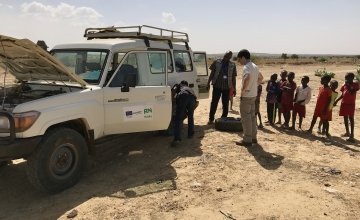
We transfer to another vehicle, but after an hour’s journey, it also grinds to a halt. We have a puncture – our tyre has taken a pounding on the sharp pumice rock surface. This environment is extreme, harsh and unforgiving.
When we arrive in the village of Sarkeki, almost 50 kilometres further south, hundreds of women have gathered – queueing quietly and orderly in the scorching afternoon heat.
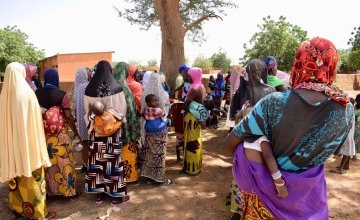
They are here to receive a vital cash lifeline from Concern. Their last poor harvest has left them desperately vulnerable. One woman says the millet and sorghum she planted “only lasted a month”. Her cowpeas did marginally better, but resulted in a meagre harvest of two kilograms - barely enough to feed them for a week.
Mother-of-four Tsahara Maidagi waits patiently in line with her 19-month-old son Mamane.
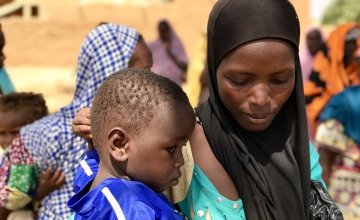
She tells us that her family often stretched to a single meal a day and went without food “not just once but all the time”.
Tsahara is one of more than 300 women who have received a monthly cash handout and a sack of fortified flour over the past six months from Concern.
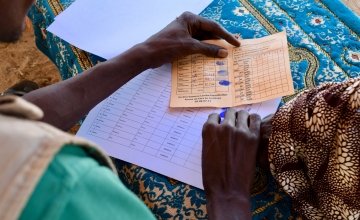
It is a stopgap intervention, but necessary if lives are to be saved. The alternative is stark – hunger, starvation and even death.
She tells us:
After the harvest was so poor, we thought to ourselves, ‘Where are we going to find food? We were frightened… every night we were not able to sleep because we knew we would not have anything to give to the children. Before we received help from Concern, we were in only one situation – looking left and right for food. Now, we know we have enough for the family.
The women in Sarkeiki say that increasingly they have to survive with less and less water, while rainy seasons have become much shorter and harder to predict – indications that food crises in Niger could become regular occurrences. That is why Concern is not just responding to immediate needs but working with communities to find effective ways to cope when harvests fail and times are tough.
Our final stop is Sabon Kalgo – around three hours’ journey north-west of Sarkeki, and another area adversely affected by intermittent rains and poor harvests.
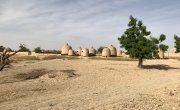

37-year-old father-of-three Mika Abu greets us and we walk through the village - the adobe walls around each domed-roof house partly hidden under drifted sand. We sit together under the shade of a spindly-leaf neem tree at the edge of a stagnant pond that is the community’s only water source.
Mika tells us it has been a struggle to produce enough food for his family. His three-year-old daughter Habibah was moderately malnourished a year ago.
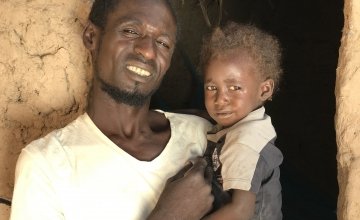
It is a familiar story:
It all depends on the rainy season. If there’s enough rain we will have a harvest.
Last year, he harvested five bags of sorghum, but this year, he collected fewer than two. That has meant he has had to look elsewhere for additional food – and the reason why he is among the first in the village to embrace new farming techniques promoted by Concern for such a tough environment and changing climate.
Mika shows us the courgettes, amaranth and cabbages he is now cultivating in several vegetable sacks in his back yard.
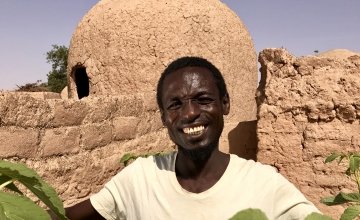
He has already started to reap the benefits by harvesting amaranth leaves.
It’s only now when I see what has been produced that I understand. I now realise that what Concern has done for us is something good. It provides us with additional food for us to eat.
The sacs potager require only a limited amount of water for leafy vegetables to grow all year round. The idea was new to Mika but one he was willing to adopt:
Being able to grow it ourselves is good for the health of the family
Mika has also harvested his first crop of short-season millet, from seeds distributed by Concern.

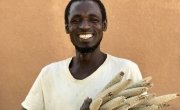
The new variety grows in half the time – in 65 days rather than the 100 days for the local variety. The advantage for his family is that they “don’t have to wait as long for food”.
He has also begun to cultivate millet, sorghum, cowpeas and groundnuts on land that was once hard to farm – thanks to newly learned agricultural techniques, such as using organic compost, retaining moisture in the soil, and avoiding cutting down tree saplings.
Mika says:
I’ve concentrated all my energy into what I’ve learned and been able to cultivate land that was once degraded. I’ve transformed half a hectare and that has meant that my yield has increased.
As we leave Sabon Kalgo and journey back to Tahoua, we pass the stabilisation centre where twin Ousseina was nursed back to health. Her mother Chawda’s final words to us were heart breaking: “I will return home tomorrow with just one child”.
It is a reminder that rural communities in Niger are disproportionally affected by the consequences of a changing climate, and it is children who suffer the most.
Thousands of children across Niger are severely malnourished, will you help change this?
